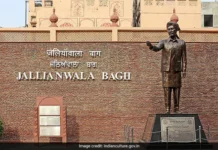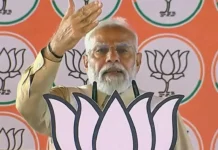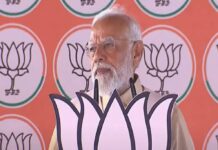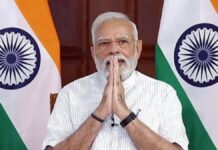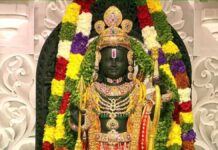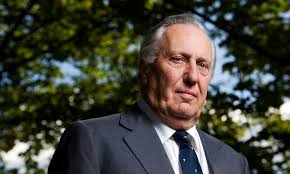 NEW DELHI: Thriller writer Frederick Forsyth has finally revealed a long-kept secret that he worked for British secret intelligence service MI6 and sent information about the late 1960s Biafran War in Nigeria besides being involved in missions in erstwhile East Germany, Rhodesia and South Africa.
NEW DELHI: Thriller writer Frederick Forsyth has finally revealed a long-kept secret that he worked for British secret intelligence service MI6 and sent information about the late 1960s Biafran War in Nigeria besides being involved in missions in erstwhile East Germany, Rhodesia and South Africa.
The British writer, author of novels like “The Day of the Jackal”, “The Fourth Protocol”, “The Dogs of War”, “The Odessa File”, “The Cobra” and “The Kill List”, shares this information and many others in his autobiography “The Outsider: My Life in Intrigue.”
In late 1968, on a brief home visit from Biafra to firm up some correspondent contracts with various London papers, Forsyth met a member of the MI6 who needed an “asset deep in the Biafran enclave”, what he termed ‘someone in on the ground’.
“When I left for the return to the rainforest, he had one,” the author writes in his memoir published by Penguin Random House.
Forsyth’s job was three-fold.
The first was to report, through the various media houses which accepted him as a stringer, the military war as it crawled on its way. Then he was to use the same outlets to portray the humanitarian situation, the disaster among children dying of protein deficiency and the church-based efforts to keep them alive with an air bridge of illicit mercy flights bringing in relief food donated by literally the whole world.
His third task was to keep Ronnie informed of things that could not, for various reasons, emerge in the media.
“For the last year of the Biafran War I was sending…
both journalistic reports to the media and other reports to my new friend,” he says.
Thereafter, he also conducted a mission for MI6 in communist East Germany, given the task of gauging the intentions of the then Rhodesian government in the 1970s and asked to find out the government’s plans on nuclear weapons in the post-apartheid period.
On his East Germany mission, he writes, “There was an asset, a Russian colonel, working for us deep inside East Germany and he had a package that we needed brought out. No, not in East Berlin but based outside Dresden. He could not get further than a meet in Dresden. It began to be not quite so simple. Dresden was a long way in.
“It would have to be by car because the package, which in deference to Alfred Hitchcock I always called the McGuffin, would have to be concealed far from prying hands and eyes on the way out. Besides, there was another package for the asset which had to go in. So, a swap. One in and one out.”
Forsyth drove his Triumph Vitesse convertible to Dresden and received the consignment from the Russian colonel in the toilets of the Albertinum museum. . In return for his missions, Forsyth says members of MI6 helped him with research for his books.
“I had a number to ring. I would have a lunch at the club, I’d ask is it OK?” he writes. “They would check with their superiors.”
Forsyth has packed a tremendous amount of action into his life and frequently drawn on his experiences to lend verisimilitude to his fiction. At the age of 19, he became the youngest pilot in the Royal Air Force, but then decided to follow a journalistic career as “it was the only job that might enable me to travel and keep more or less my own hours”.
After three years as a provincial reporter, he joined Reuters and spent the next four years in Europe.
In 1965, Forsyth joined the BBC and was sent to Biafra to cover the war that was raging in Nigeria. But he resigned, turned freelance and vanished into the thick of the conflict and later emerged to publish the highly controversial “The Biafra Story” after it was difficult for him to toe the editorial line of the BBC’s coverage on the war.
In 1969 he decided to use his experience as a Reuters reporter in France as the basis for a thriller. Within 35 days he completed “The Day of the Jackal”, which established him as one of the world’s leading thriller writers. To date it has sold in the region of 10 million copies and was made into a major film starring Edward Fox in 1973.
During the course of his life, Forsyth barely escaped the wrath of an arms dealer in Hamburg, had been strafed by a MiG during the Nigerian civil war and landed during a bloody coup in Guinea-Bissau.
“The Stasi arrested me, the Israelis regaled me, the IRA prompted a quick move from Ireland to England, and a certain attractive Czech secret police agent well, her actions were a bit more intimate,” he says, adding, “All of that I saw from the inside. But all the time I was, nonetheless, an outsider.”
“To be honest, I never intended to be a writer at all.
Long periods of solitude were first a circumstance, then a preference and finally a necessity.”
So why did he eventually become a writer? “It was a fluke.
I wanted not to write but to travel the world. I wanted to see it all, from the snows of the Arctic to the sands of the Sahara, from the jungles of Asia to the plains of Africa.
Having no private funds, I opted for the job I thought would enable me to do this,” he writes.
In a case of life imitating art, while researching his book “The Cobra”, Forsyth arrived in the West African state of Guinea-Bissau on the very day that the Army chief-of-staff was murdered, allegedly by order of the President.
That night, in a tit-for-tat attack, the President himself was bombed out of his residence, shot and hacked to death.
Unable to leave the country, Forsyth found himself back in the role of journalist reporting on this coup for the British press.–PTI

